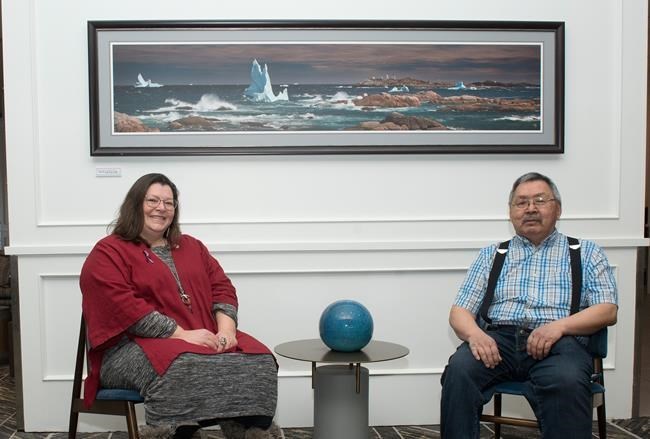ST. JOHN'S, N.L. — The federal housing advocate was in St. John's, N.L., this week to join the leader of the Nunatsiavut Inuit in his long-standing fight for an end to the "deplorable" housing conditions in northern Labrador.
Marie-Josée Houle and Johannes Lampe met with Premier Andrew Furey on Thursday to discuss the recommendations of a report from Houle's office that described housing conditions for Labrador Inuit, and for Inuit across Canada, as a "staggering failure" of all levels of government.
Houle and Lampe are calling on the province to transfer control of public housing in the region to the Nunatsiavut government, to develop a long-term plan to improve housing conditions for Labrador Inuit, and to hire someone to monitor the plan's implementation.
They are also calling on Paul Pike, the provincial housing minister, to go see the housing conditions for himself.
"For too long, we have not been listened to," Lampe said in an interview Friday, adding that Labrador Inuit have faced decades of "dismissal and ignorance" from provincial governments in trying to discuss the region's housing issues.
He said Inuit should not have to "go begging" for something so urgently needed, and he hopes the meetings will continue beyond this week.
Houle's report was released in late November, and it detailed a dire lack of affordable housing in Nunatsiavut, and poor conditions in the housing that does exist. It includes reference to one person in Nunatsiavut who burned down parts of their house to keep warm during the frigid winter months, and of people in Labrador who resort to sleeping in their cars or tents. A "lack of long-term housing options continues to put Inuit women in Nunatsiavut at risk of having their children seized by the state," the report reads.
Many houses were built poorly and hastily when the government forced Inuit to relocate in the 1950s from their traditional communities of Nutak and Hebron to the towns along the coast, Houle said Friday in an interview.
Homes have poor ventilation, inadequate insulation and no protection from melting permafrost, which leads to freezing indoor temperatures and spreading black mould.
Inuit homes have wooden foundations, whereas the houses built for RCMP officers in the communities have concrete foundations, "like any home in any suburb across Canada," she added.
Mortgages and home insurance are unaffordable, if they can be found at all, and Houle said she'd like the Newfoundland and Labrador government to look at whether it can step in to help.
The Canadian government recognized the human right to housing in 2019 through the National Housing Strategy Act, which also saw the creation of Houle's position to ensure the government acts to make that right a reality. That human right is not being met for Inuit in Nunatsiavut, she said.
Houle and Lampe said they want the Newfoundland and Labrador government to develop a 50-year plan to rectify that, and to appoint someone who can work alongside Labrador Inuit, and with the provincial and federal governments, to see the plan through.
"This is the result of over 50 years of neglect. It's time to have at least a 50-year plan," she said.
Lampe said the provincial government must also act immediately to help those struggling to stay warm and afford food as they pay exorbitant amounts to heat their poorly insulated homes.
"We are proud to have this homeland," Lampe said. "But when we were relocated in 1956 and 1959, we were rendered homeless ... and we should be given the opportunity to get the adequate housing we were promised."
In a statement emailed Friday, Pike said he will visit the Nunatsiavut region "in the near future."
In the meantime, his department will work with the Nunatsiavut government to build a plan, he said. This includes assessing the housing needs in the region, finding "innovative solutions appropriate for northern climates" and participating in regular discussions to find those solutions.
Pike said the province is open to giving the Inuit government control of its public housing units in Nunatsiavut, many of which sit empty waiting for repair.
The province cannot address all of the recommendations in Houle's report alone, Pike added.
"Rather, we recognize that they will require all levels of government, including the federal government, to work together on solutions," he said.
This report by The Canadian Press was first published Jan. 26, 2024.
Sarah Smellie, The Canadian Press




